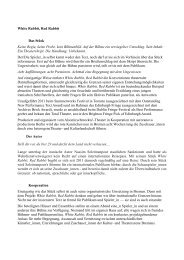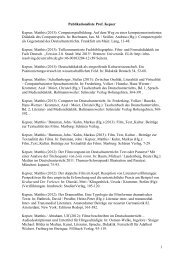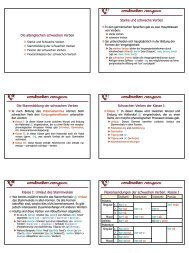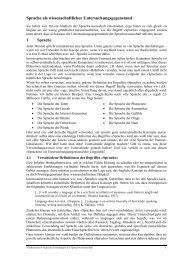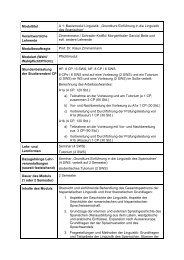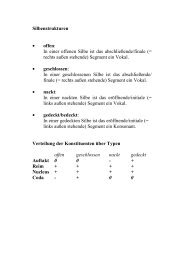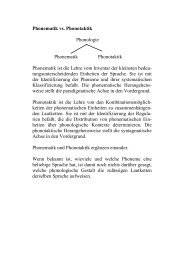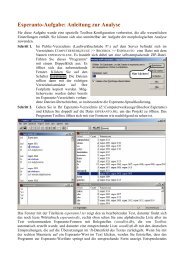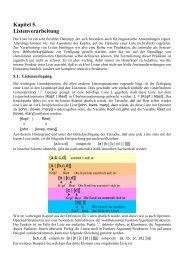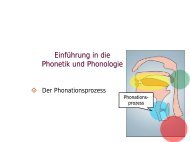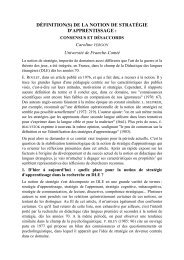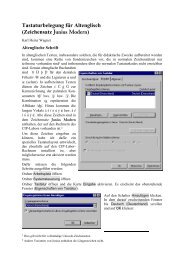Relativism and Universalism in Linguistics - Fachbereich 10 ...
Relativism and Universalism in Linguistics - Fachbereich 10 ...
Relativism and Universalism in Linguistics - Fachbereich 10 ...
Create successful ePaper yourself
Turn your PDF publications into a flip-book with our unique Google optimized e-Paper software.
Section G: Verbal Categories (aspect <strong>and</strong> sundry dist<strong>in</strong>ctions) 81<br />
Aspect, modality, <strong>and</strong> closely-related categories:<br />
the case of Russian<br />
Shmelev, Alexei / Zalizniak, Anna<br />
Moscow Pedagogical State University / Russian Academy of Sciences, Moscow<br />
shme.lev@ru.net;anna-zalizniak@mtu-net.ru<br />
It is sometimes claimed that deontic modality is l<strong>in</strong>ked to perfective aspect. The Russian<br />
evidence does not seem to support this claim. On the contrary, the general rule of express<strong>in</strong>g<br />
modal or near-modal mean<strong>in</strong>gs by Russian aspect is as follows: the st<strong>and</strong>ard modal<br />
<strong>in</strong>terpretation for a perfective verb is alethic while the st<strong>and</strong>ard modal <strong>in</strong>terpretation for an<br />
imperfective verb is deontic. Consider two sentences: Zdes’ mozhno perejti (perf.) ulicu vs.<br />
Zdes’ mozhno perexodit’ (imperf.) ulicu. The first sentence expresses a general idea of<br />
possibility (‘One can cross the street here’); the second one implies that cross<strong>in</strong>g the street<br />
here would not violate the traffic regulations.<br />
The above tendencies are even more clear under negation. For example, K oknu ne podojti<br />
(perf.) means that there is no access to the w<strong>in</strong>dow (it is impossible or extremely difficult to<br />
come close to it) while K oknu ne podxodit’ (imperf.) would express prohibition to come close<br />
to the w<strong>in</strong>dow. The sentence Zdes’ nel’zja oshibit’sja (perf.)means: ‘one would never make a<br />
mistake here’ (the most natural read<strong>in</strong>g, with the stress on nel’zja ‘not possible’); the sentence<br />
Zdes’ nel’zja oshibat’sja (imperf.) would have stress on the verb <strong>and</strong> would mean: ‘one<br />
should be attentive <strong>in</strong> order to avoid possible mistakes’.<br />
The above regularities are no more than tendencies. Both perfective <strong>and</strong> imperfective aspect<br />
may have alethic <strong>and</strong> deontic as well as epistemic read<strong>in</strong>gs <strong>in</strong> certa<strong>in</strong> conditions.<br />
The opposition between alethic <strong>and</strong> deontic modality is closely related to the feature of<br />
controllability. Thus, the imperfective verb <strong>in</strong> modal constructions under negation is liable to<br />
be employed <strong>in</strong> case of controlled actions (express<strong>in</strong>g prohibition, that is deontic modality),<br />
while the perfective verb may be used <strong>in</strong> such constructions if reference is made to an event<br />
that is beyond the subject’s control (mean<strong>in</strong>g impossibility, that is, alethic modality).<br />
Consider the follow<strong>in</strong>g sentences: Nel’zja budit’ (imperf.) otca ‘You ought not to wake<br />
father’ (deontic read<strong>in</strong>g) vs.Nel’zja razbudit’ (perf.) otca ‘It is impossible to wake father’<br />
(alethic read<strong>in</strong>g).<br />
The opposition between controllability <strong>and</strong> uncontrollability may overshadow modal<br />
dist<strong>in</strong>ctions (cf. [Bulyg<strong>in</strong>a, Shmelev 1999]). Consider the follow<strong>in</strong>g sentences: Ne budite<br />
(imperf.) otca ‘Don’t wake father’ vs. Ne razbudite (perf.) otca ‘Be careful not to wake<br />
father’. The former can be stated as a warn<strong>in</strong>g not to perform the controllable <strong>in</strong>tentional<br />
action (deontic read<strong>in</strong>g) while the latter would be understood as a caution aga<strong>in</strong>st<br />
uncontrollable un<strong>in</strong>tentional accidence. The above po<strong>in</strong>t may also be illustrated by the<br />
contrast between the follow<strong>in</strong>g utterances: Ja bojus’ budit’ (imperf.) otca ‘I am afraid to wake<br />
my father up’ (controllable action) vs. Ja bojus’ razbudit’ (perf.) otca ‘I am afraid of wak<strong>in</strong>g<br />
my father up’ (uncontrollable action).<br />
References<br />
Bulyg<strong>in</strong>a, Tatiana V., <strong>and</strong> Alexei D. Shmelev. 1999. On the semantics of some Russian<br />
causative constructions: aspect, control, <strong>and</strong> types of causation. In: Tense-aspect,<br />
transitivity <strong>and</strong> causativity: essays <strong>in</strong> honor of Vladimir Nedjalkov, ed. by Werner<br />
Abraham, Leonid Kulikov. John Benjam<strong>in</strong>s Publish<strong>in</strong>g Co



